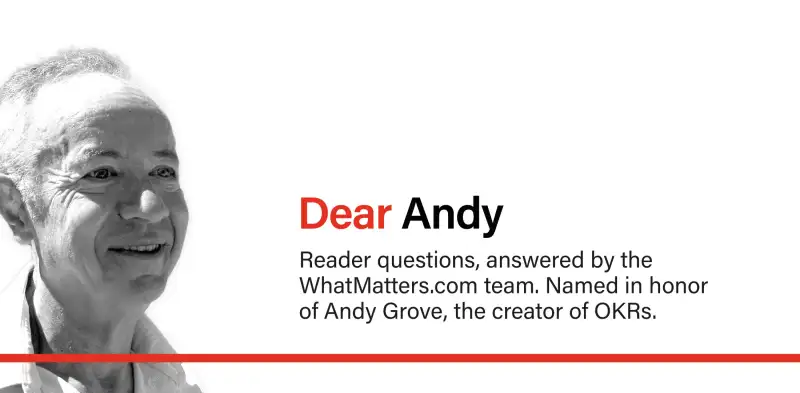Dear Andy,
I work on an RtI team at a high school that is focused on improving how we can support students! For clarity, RtI stands for Response to Intervention, and is a multi-tier approach to the early identification and support of students with learning and behavior needs. Would LOVE feedback, questions, and/or reactions on our OKRs!
O: Developing a data-focused approach to identifying and responding to classroom behaviors in positive and proactive ways.
KR1: Meet with a cohort of students of varying backgrounds to identify and discuss behaviors.
KR2: Partnering with PTO/PTO representation for RtI team to increase awareness and potential support.
KR3: Publish data about building behavioral data each quarter for staff information/feedback via weekly memo and staff meetings.
KR4: Collaborate at the beginning of the year with the LIM team to discuss roles of both teams, timeline of work, and schedule meetings moving forward.
KR5: Develop and pilot war-room approach with a select number of junior teachers to collaboratively answer, “How do we support the unmotivated student?”
Sincerely,
Ashley

Hi Ashley!
Thanks for reaching out! I can’t tell you how excited I am to see educators using the OKR system. Your OKRs are in good shape already, but I have a few ideas that I think will really take things to the next level. Let’s get going, shall we?
While I appreciate how clear and concise your Objective is, I think we can mine a little more out of it. Why do you want to develop this data-focused approach? Once you develop it, what do you hope to do or hope will happen?
Your current Objective defines an activity. But let’s take it to the next level and define the activity’s outcome. What is your ultimate goal here? Teachers who are better prepared? A flawless educational experience for students in the RtI program? The best Objectives are meaningful, memorable, and succinct. Dig a bit deeper, toss some of the technical lingo, and state, above all else, what your team’s purpose is. Don’t be afraid to keep things simple!
Here are a few possible examples for you:
O: Be the most effective and efficient RtI team in the county.
O: Teachers feel 100 precent prepared for RtI students.
Your Objective should tell me not only what you want to do, but also why you want to do it. Dream big!
Similarly, in your KRs, the underlying theme I’m seeing is that they focus on prescribing the activity, rather than the desired outcomes of said activities. In other words, your current KRs specify the tasks that need to be done. Better KRs will describe the most important set of changes that will tell you whether you’re on track. How will you know when your team is able to identify and respond to classroom behaviors in positive and proactive ways? It’s not because you have meetings, or that you have a database. It’s that some behaviors will be increased (e.g., teacher satisfaction/student attendance) and others may be decreased (negative outbursts/disciplinary actions/parent complaints). They’re called Key Results for a reason. Make sense?
Take KR1, for example. Rather than describe the meeting (the activity), let your KR describe the milestone you hope to achieve once the activity is done (the outcome). Correct me if I’m wrong, but it sounds like you want to make sure the data you’re collecting comes from students of all backgrounds? Fantastic — that’s super measurable! What if it was worded something like this?
KR: Behaviors and responses include data from all our students’ diverse ages and backgrounds.
Remember: When you reflect upon/grade your KRs at the end of the cycle, you want to be able to answer the question “Did we get this done?” with a clear yes or no.
With that all said, here are my proposed OKRs for you and your team.
See the difference? The Objective is simpler and concise, with a clear sense of “why.” The KRs are all measurable and will directly impact your team’s success in achieving your ultimate goal. Remember, OKRs are not everything you need to do, but the three to five most important outcomes you’ll focus on this semester.
Well, Ashley, I hope that helps. Thanks so much for writing in — it’s clear you and your team are committed to being the best you can be. May all students be so lucky to have such passionate and devoted teachers on their side. Best of luck in the future, and I look forward to hearing how OKRs are working out for you!
Sincerely,
Billy from the What Matters team

Have a question for Dear Andy? Click here to submit your OKR queries.



